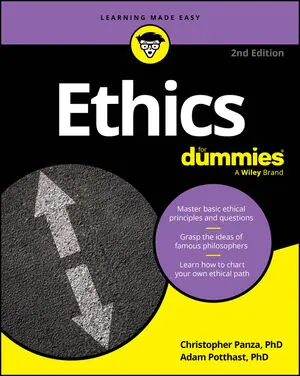This builtin is not currently supported: Animation
- Book & Article Categories

- Collections

- Custom Solutions
 Main Menu
Main MenuBook & Article Categories
 Main Menu
Main MenuBook & Article Categories
Christopher Panza
Christopher Panza, PhD, teaches courses on existentialism, ethics, and free will and has published articles on teaching philosophy.
Articles & Books From Christopher Panza
Cheat Sheet / Updated 12-22-2025
Ethics is the study of the way things ought to be. Ethics applies to topics as mundane as doing your taxes and as momentous as how to structure government. Studying ethics can give you deep insights into what people do and why they do it. If you let it, studying ethics also can motivate you to change morally questionable habits and live an ethical life.
Your approachable guide to ethical philosophy Ethics For Dummies, 2nd Edition is an easy-to-grasp introduction to the branch of philosophy that deals with living a good life. Learn about the most important concepts and thinkers in the world of ethics, so you can analyze issues in the modern world from an ethical perspective.
Cheat Sheet / Updated 03-10-2022
No doubt you've heard someone speaking of an "existential crisis." What does that really mean, anyway? Existentialists believe that we're born without purpose into a world that makes no sense — but each person has the ability to create his or her own sense of meaning and peace. Discover who invented this relatively new school of philosophy as well as what concepts define existentialism.
Article / Updated 07-15-2021
Ethics is a central component of any happy, healthy, and mature life. But some critics still question the value of studying ethics and living an ethical life. After all, if you ignore ethics, you can just focus on yourself, right? Not so fast. Some great reasons to resist those critics include the following:
Ethics allows you to live an authentic life.
Article / Updated 07-15-2021
Studying ethics can help you arrive at clearer positions and arguments on real life issues — and can help you apply them, too. In fact, thinking more about ethical theory may even change your mind about issues in today’s world. Here are some ways you can apply ethics to your life:
Consider how you interact with animals.
Article / Updated 07-15-2021
Ethical theory serves as the foundation for ethical solutions to the difficult situations people encounter in life. In fact, for centuries, philosophers have come up with theoretical ways of telling right from wrong and for giving guidelines about how to live and act ethically. Here are a few ethical theories to whet your appetite:
Virtue ethics states that character matters above all else.
Article / Updated 03-26-2016
The meaninglessness of life, the absence of God, the loneliness of being a thinking individual — it sounds like the existentialists weren't the happiest group of folks, right? Not necessarily true. Read on to get an idea of what existentialism is all about.
Absurdity: What human beings encounter when they come into contact with the world.
Article / Updated 03-26-2016
Existentialism is a term applied to some late 19th- and 20th-century philosophers who may not have agreed about much, but who all believed that each person must define themselves in an absurd, illogical world. The following are the core figures of existentialist philosophy.
Søren Kierkegaard (1813–1855): The Danish son of a wealthy merchant, Kierkegaard never held an academic post, but he wrote voluminously.
Have you ever wondered what the phrase “God is dead” means? You’ll find out in Existentialism For Dummies, a handy guide to Nietzsche, Sartre, and Kierkegaard’s favorite philosophy. See how existentialist ideas have influenced everything from film and literature to world events and discover whether or not existentialism is still relevant today.





